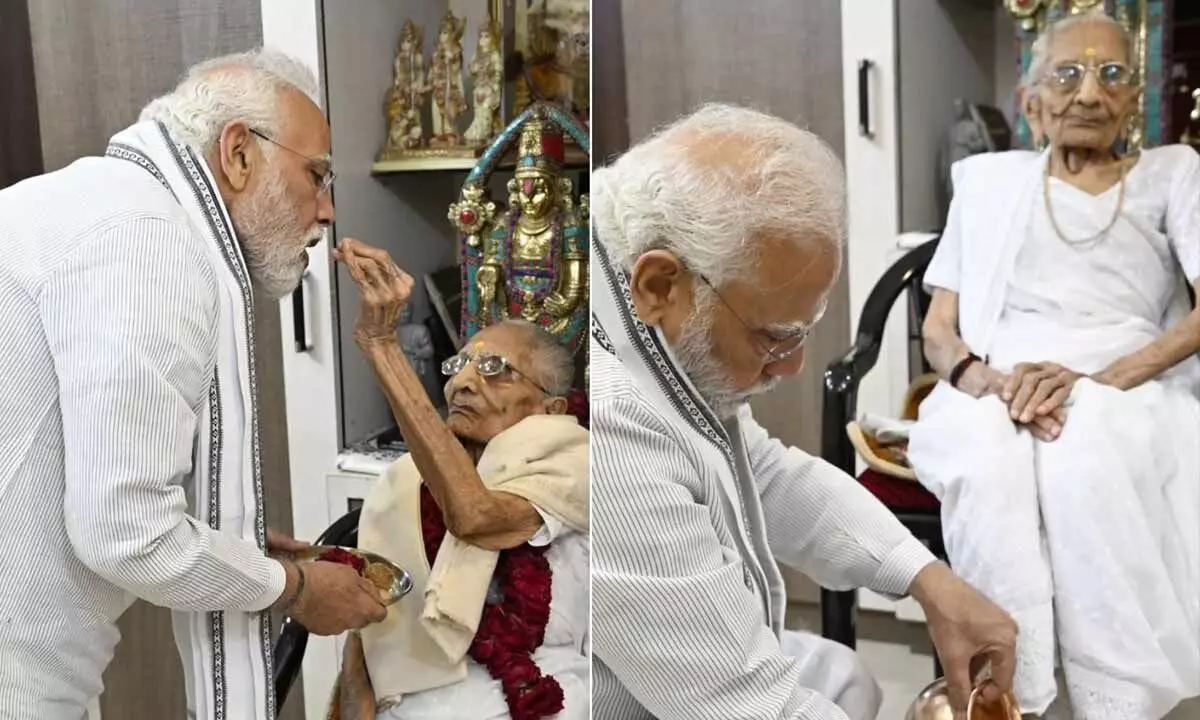Maa tujhe salaam!

Maa tujhe salaam!
One may have differences with Modi politically and may differ with his policies, but there is something one needs to learn from the simple way the Prime Minister performed the last rites and did not allow his mother Heeraba’s demise to overshadow his official engagements.
One may have differences with Modi politically and may differ with his policies, but there is something one needs to learn from the simple way the Prime Minister performed the last rites and did not allow his mother Heeraba's demise to overshadow his official engagements. Some may call it a political stunt.
If he wanted, as Prime Minister he could have kept the body for a day at some prominent place and thousands of people including party workers, party leaders, Chief Ministers, entire Union Cabinet etc., would have thronged the place and paid their respects to the departed soul. Next day, the body could have been taken out in a well-decorated open truck with all official and government honours and the last rites could have been performed. But Modi decided to make it a simple affair and the last rites were completed within six hours of his mother being declared dead.
Heeraba, as she is fondly called, was a very humble and simple lady and Modi ensured that the same simplicity was maintained even during her last rites. One would have noted that not even a single Union Minister including Amit Shah who is said to be very close to Modi was not present. All of them were told not to disturb their schedule. It was kept as a purely family affair and only the Chief Minister Bhupendra Bhai Patel and a few of his cabinet ministers were present when the body was brought to the crematorium and they too left soon after the lighting of the pyre.
Why did Modi choose a simple cremation? In his own words, his mother had struggled a lot during her early life but was a lady with strong principles which stood the test of time.
When Heeraba entered 100th year, Modi in a blog recalled many incidents from his childhood. He specially mentioned one incident when he wanted to felicitate his mother – as a teacher. Heeraben declined and said she was just an ordinary person and only gave birth to him while the almighty brought him up. "Even today, there are no assets in Mother's name. I have never seen her wear any gold ornaments, and she has no interest either. Like earlier, she continues to lead an extremely simple lifestyle in her small room," PM Modi wrote. Mother, he said, is not just any other word in the dictionary. It encompasses a whole range of emotions – love, patience, trust, and a lot more. A mother not only gives birth to her children, but also shapes their mind, their personality, and their self-confidence. And while doing so, mothers selflessly sacrifice their own personal needs and aspirations.
"I have no doubt that everything good in my life, and all that is good in my character, can be attributed to my parents. Today, as I sit in Delhi, I am filled with memories from the past," he said, adding: "My Mother is as simple as she is extraordinary. Just like all mothers! As I write about my Mother, I am sure that many of you would relate to my description of her. While reading, you may even see your own mother's image."
A mother's penance creates a good human being. Her affection fills a child with human values and empathy. A mother is not an individual or a personality, motherhood is a quality.
Heeraba was born in Visnagar in Mehsana in Gujarat, which is quite close to Modi's hometown Vadnagar. She did not get her own mother's affection. At a tender age, she lost her mother to the Spanish Flu pandemic. "She does not even remember my grandmother's face or the comfort of her lap. She spent her entire childhood without her mother. She could not throw tantrums at her mother, as we all do. She could not rest in her mother's lap like we all do. She could not even go to school and learn to read and write. Her childhood was one of poverty and deprivation," he said.
Modi wrote, "Mother did not have much of a childhood due to these struggles – she was forced to grow beyond her age. She was the eldest child in her family and became the eldest daughter-in-law after marriage. In her childhood, she used to take care of the entire family and manage all the chores. After marriage, too, she picked up all these responsibilities. Despite the onerous responsibilities and everyday struggles, Mother held the entire family together with calm and fortitude.
"In Vadnagar, our family used to stay in a tiny house which did not even have a window, let alone a luxury like a toilet or a bathroom. We used to call this one-room tenement with mud walls and clay tiles for a roof, our home. And all of us – my parents, my siblings and I – stayed in it.
"My father made a machaan from bamboo sticks and wooden planks to make it easier for Mother to cook food. This structure was our kitchen. Mother used to climb on the machaan to cook, and the entire family would sit on it and eat together. Like clockwork, my father used to leave for work at four am. Another daily ritual was to pray at the local temple before opening his little tea shop. Mother would also wake up with my father, and finish many chores in the morning itself. From grinding grains to sifting rice and daal, Mother had no help. While working she would hum her favourite bhajans and hymns. Mother never expected us, children, to leave our studies and assist her with the household chores. She never even asked us for help.
"However, looking at her work so hard, we considered helping her our foremost duty. I used to really enjoy swimming in the local pond. So, I used to take all the dirty clothes from home and wash them at the pond. The washing of clothes and my play, both used to get done together. Mother used to wash utensils at a few houses to help meet the household expenses. She would also take out time to spin the charkha to supplement our meagre income. She would do everything from peeling cotton to spinning yarn. Even in this back-breaking work, her prime concern was ensuring that the cotton thorns don't prick us."
Modi went on to say, "monsoons would bring their own troubles for our mud house. Mother ensured that we faced minimum discomfort. In the searing heat of June, she would clamber over the roof of our mud house and repair the tiles. However, despite her valiant efforts, our house was too old to withstand the onslaught of the rains. During the rains, our roof would leak, and the house would flood. Mother would place buckets and utensils below the leaks to collect the rainwater. Even in this adverse situation, Mother would be a symbol of resilience. You will be surprised to know that she'd use this water for the next few days. What better example than this of water conservation!
"She would smear the floor with cow dung. Cow dung cakes emit a lot of smoke when burnt. And Mother would cook with them in our windowless house! The walls would get blackened by soot and require fresh whitewashing. This too Mother would do herself every few months. This would give our dilapidated home a scent of freshness. She would also make pretty little clay bowls to decorate the house. And she was a champion in the famous Indian habit of recycling old household items."
Modi recalls a slight crease meant that the bed sheet would be dusted and laid again. "She had another quality – a deep respect for those involved in cleaning and sanitation. I remember, whenever someone would come to clean the drain adjacent to our house in Vadnagar, Mother wouldn't let them go without giving them tea. Our house became famous amongst safai karamcharis for tea after work.
"Another habit of Mother that I always remember is her special affection for other living beings. Every summer, she would put out water vessels for the birds. She ensured that stray dogs around our house never went hungry. Mother would make delicious ghee from the cream that my father would bring back from his tea shop. And this ghee was not just for our consumption. The cows in our neighbourhood too were entitled to their share. Mother would feed rotis to the cows every day. Mother insisted on not wasting a single grain of food. There was a clear rule in the house – only take as much as you can eat. Mother would find happiness in other people's joys. "
Posting a heartfelt tribute to his mother, Modi aptly said, "A glorious century rests at the feet of God... In Maa, I have always felt that trinity, which contains the journey of an ascetic, the symbol of a selfless Karmayogi and a life committed to values."




